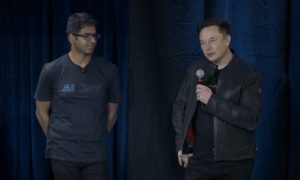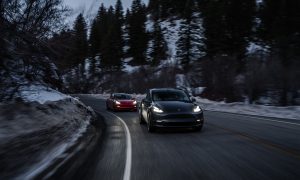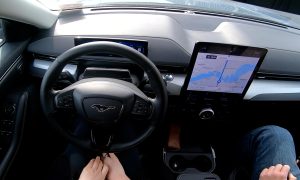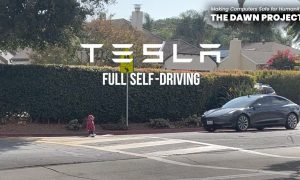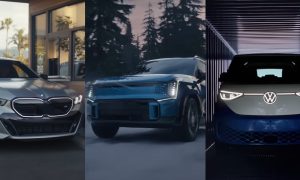News
Tesla defends its right to release individual driver data to disprove claims
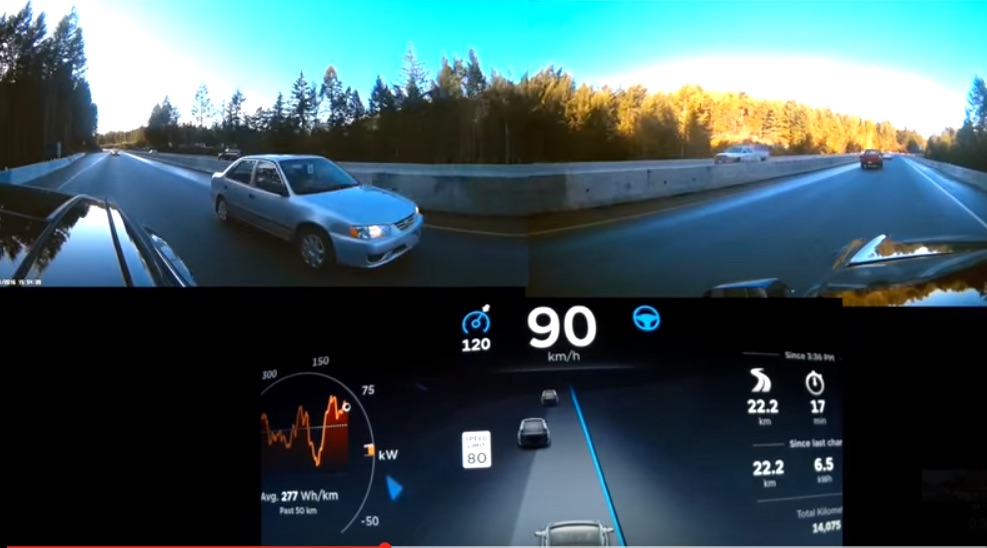
During a week in which the House of Representatives voted to repeal Obama era Internet privacy protections, Tesla has come under fire from owners who dispute the all-electric carmaker’s right to disclose individual driver data to the media while also failing to share that data with the drivers themselves.
A pattern of Tesla public data dissemination has occurred after accidents in which Tesla vehicles have had automation software engaged. Tesla vehemently stands behind the safety and reliability of its cars, citing how its “Autopilot has been shown to save lives and reduce accident rates.” That comment came as result of a request from The Guardian. In explanation as to why Tesla releases individual driver information to the media, the Tesla spokesperson added, “We believe it is important that the public have a factual understanding of our technology.”
It is important to note that, in a famous case in which a Tesla Model S was the subject of serious scrutiny following a driver’s death after colliding with a truck while the driver-assist feature was engaged, the U.S. National Highway Traffic Safety Administration issued a report of no fault on Tesla’s part. Indeed the report stated that “Tesla vehicles crash rate dropped by almost 40 percent after Autosteer installation.”
What’s being contested here then? Several things, actually. Tesla feels it has an explicit corporate need to stand behind its driving-assist Autopilot technology through public disclosures of individual driving data when a crash occurs. Individual Tesla drivers, on the other hand, express a desire to maintain the right to information privacy regarding their driving performance. And, while Tesla has disseminated individual driver information to the media following Tesla crashes involving its Autopilot system, it continues to deny data sharing with individual customers. Moreover, the company does not follow the commonly accepted research practice of gaining permissions from study participants prior to including them in a data set.
And now some Tesla owners are fired up.
The technology available within a Tesla can provide information about the location of a driver’s hands on the steering wheel, if and when a driver’s door opens, and, importantly, the engagement and performance levels of autonomous technology. Tesla insists that it only releases specific driver data to the media when information has been misrepresented to the public.
Tesla crashes always seem to catch media attention. After a fatal early morning Tesla Model S crash in Indianapolis, a distraught dad claimed that his daughter would still be alive if she had been driving any other car but a Tesla. In a Baarn, Netherlands accident in which a Tesla Model S collided at high speed with a tree and killed the driver, Tesla investigated alongside local authorities. Uncertain as to whether Tesla’s Autopilot feature was engaged, the company said at the time it would analyze data collected through vehicle recovery procedures and “ share it with the public” once reports became final. In 2016, the first crash in China involving a Tesla operating in Autopilot mode caused a great deal of consternation. And a driver of a Model X that crashed along a trek to Yellowstone in Montana posted an open letter to Elon Musk and Tesla, asking the company to “take responsibility for the mistakes of Tesla products” and accusing Tesla of using drivers as “lab rats” for testing of its Autopilot system.
It is that dehumanization of Tesla drivers which has suddenly come to the forefront. Yes, as in all vehicular incidents, various factors come into play, especially driver error: physical (tired), emotional (angry), psychological (confused), or intellectual (distracted) factors occur when a person gets behind the wheel. But that’s not what is at issue in the case of drivers’ rights to information privacy when they engage technology applications. Is driving a personal act, a type of agency for which the driver assumes all responsibility? And, if all research institutions are required to acquire ethical consent from participants, why is Tesla absolved of such responsibility? The answers to these questions will continue to evolve as technology advances at amazing speeds.
In the upcoming age of self-driving cars, every touch screen signal is transmitted to the cloud as an immediate extension of a car’s functionality. A year ago, at a Congressional hearing about driverless cars, Massachusetts Senator Ed Markey questioned over and over whether driverless car manufacturers would assume a minimum standard for consumer privacy protection. None of the constituents present answered his question.
And now, with the U.S. Congress clearly opposed to internet privacy protections, will the public — Tesla drivers included — give up the fight? Will it be “the classic politics of resignation,” as Lawrence Lessig, a Harvard law professor, asserts? He says, “Most people… pick fights they know they can convince people they can win.” It’s an era in which the U.S. Presidential transition team members, according to Politico, had to sign non-disclosure agreement to make certain they keep all of their work confidential. Tesla, too, likes to keep internal information quiet, yet California lawmakers sent a letter to Tesla in January, 2017 asking the company to loosen its employee confidentiality agreement.
Major institutions want their information kept inside closed doors. Can drivers claim the right to privacy of what will become ubiquitous self-driving technology information systems of the future?
A Tesla spokesperson says the following in regards to the release of individual driver data:
“In unusual cases in which claims have already been made publicly about our vehicles by customers, authorities or other individuals, we have released information based on the data to either corroborate or disprove these claims. The privacy of our customers is extremely important and something we take very seriously, and in such cases, Tesla discloses only the minimum amount of information necessary… [We] transfer and disclose information, including personal and non-personally identifiable information … to protect the rights, property, safety, or security of the Services, Tesla, third parties, visitors to our Services, or the public, as determined by us in our sole discretion.”
News
Tesla begins Robotaxi certification push in Arizona: report
Tesla seems serious about expanding its Robotaxi service to several states in the coming months.

Tesla has initiated discussions with Arizona transportation regulators to certify its driverless Robotaxi service in the state, as per a recent report from Bloomberg News. The move follows Tesla’s launch of its Robotaxi pilot program in Austin, Texas, as well as CEO Elon Musk’s recent comments about the service’s expansion in the Bay Area.
The Arizona Department of Transportation confirmed to Bloomberg that Tesla has reached out to begin the certification process for autonomous ride-sharing operations in the state. While details remain limited, the outreach suggests that Tesla is serious about expanding its driverless Robotaxi service to several territories in the coming months.
The Arizona development comes as Tesla prepares to expand its service area in Austin this weekend, as per CEO Elon Musk in a post on X. Musk also stated that Tesla is targeting the San Francisco Bay Area as its next major market, with a potential launch “in a month or two,” pending regulatory approvals.
Tesla first launched its autonomous ride-hailing program on June 22 in Austin with a small fleet of Model Y vehicles, accompanied by a Tesla employee in the passenger seat to monitor safety. While still classified as a test, Musk has said the program will expand to about 1,000 vehicles in the coming months. Tesla will later upgrade its Robotaxi fleet with the Cyercab, a two-seater that is designed without a steering wheel.
Sightings of Cybercab castings around the Giga Texas complex suggests that Tesla may be ramping the initial trial production of the self-driving two-seater. Tesla, for its part, has noted in the past that volume production of the Cybercab is expected to start sometime next year.
In California, Tesla has already applied for a transportation charter-party carrier permit from the state’s Public Utilities Commission. The company is reportedly taking a phased approach to operating in California, with the Robotaxi service starting with pre-arranged rides for employees in vehicles with safety drivers.
News
Tesla sets November 6 date for 2025 Annual Shareholder Meeting
The automaker announced the date on Thursday in a Form 8-K.

Tesla has scheduled its 2025 annual shareholder meeting for November 6, addressing investor concerns that the company was nearing a legal deadline to hold the event.
The automaker announced the date on Thursday in a Form 8-K submitted to the United States Securities and Exchange Commission (SEC). The company also listed a new proposal submission deadline of July 31 for items to be included in the proxy statement.
Tesla’s announcement followed calls from a group of 27 shareholders, including the leaders of large public pension funds, which urged Tesla’s board to formally set the meeting date, as noted in a report from The Wall Street Journal.
The group noted that under Texas law, where Tesla is now incorporated, companies must hold annual meetings within 13 months of the last one if requested by shareholders. Tesla’s previous annual shareholder meeting was held on June 13, 2024, which placed the July 13 deadline in focus.
Tesla originally stated in its 2024 annual report that it would file its proxy statement by the end of April. However, an amended filing on April 30 indicated that the Board of Directors had not yet finalized a meeting date, at least at the time.
The April filing also confirmed that Tesla’s board had formed a special committee to evaluate certain matters related to CEO Elon Musk’s compensation plan. Musk’s CEO performance award remains at the center of a lengthy legal dispute in Delaware, Tesla’s former state of incorporation.
Due to the aftermath of Musk’s legal dispute about his compensation plan in Delaware, he has not been paid for his work at Tesla for several years. Musk, for his part, has noted that he is more concerned about his voting stake in Tesla than his actual salary.
At last year’s annual meeting, TSLA shareholders voted to reapprove Elon Musk’s compensation plan and ratified Tesla’s decision to relocate its legal domicile from Delaware to Texas.
Elon Musk
Grok coming to Tesla vehicles next week “at the latest:” Elon Musk
Grok’s rollout to Tesla vehicles is expected to begin next week at the latest.

Elon Musk announced on Thursday that Grok, the large language model developed by his startup xAI, will soon be available in Tesla vehicles. Grok’s rollout to Tesla vehicles is expected to begin next week at the latest, further deepening the ties between the two Elon Musk-led companies.
Tesla–xAI synergy
Musk confirmed the news on X shortly after livestreaming the release of Grok 4, xAI’s latest large language model. “Grok is coming to Tesla vehicles very soon. Next week at the latest,” Musk wrote in a post on social media platform X.
During the livestream, Musk and several members of the xAI team highlighted several upgrades to Grok 4’s voice capabilities and performance metrics, positioning the LLM as competitive with top-tier models from OpenAI and Google.
The in-vehicle integration of Grok marks a new chapter in Tesla’s AI development. While Tesla has long relied on in-house systems for autonomous driving and energy optimization, Grok’s integration would introduce conversational AI directly into its vehicles’ user experience. This integration could potentially improve customer interaction inside Tesla vehicles.
xAI and Tesla’s collaborative footprint
Grok’s upcoming rollout to Tesla vehicles adds to a growing business relationship between Tesla and xAI. Earlier this year, Tesla disclosed that it generated $198.3 million in revenue from commercial, consulting, and support agreements with xAI, as noted in a report from Bloomberg News. A large portion of that amount, however, came from the sale of Megapack energy storage systems to the artificial intelligence startup.
In July 2023, Musk polled X users about whether Tesla should invest $5 billion in xAI. While no formal investment has been made so far, 68% of poll participants voted yes, and Musk has since stated that the idea would be discussed with Tesla’s board.
-

 Elon Musk1 week ago
Elon Musk1 week agoTesla investors will be shocked by Jim Cramer’s latest assessment
-

 Elon Musk20 hours ago
Elon Musk20 hours agoxAI launches Grok 4 with new $300/month SuperGrok Heavy subscription
-

 Elon Musk3 days ago
Elon Musk3 days agoElon Musk confirms Grok 4 launch on July 9 with livestream event
-

 News7 days ago
News7 days agoTesla Model 3 ranks as the safest new car in Europe for 2025, per Euro NCAP tests
-

 Elon Musk2 weeks ago
Elon Musk2 weeks agoA Tesla just delivered itself to a customer autonomously, Elon Musk confirms
-

 Elon Musk1 week ago
Elon Musk1 week agoxAI’s Memphis data center receives air permit despite community criticism
-

 Elon Musk2 weeks ago
Elon Musk2 weeks agoTesla’s Omead Afshar, known as Elon Musk’s right-hand man, leaves company: reports
-

 News2 weeks ago
News2 weeks agoXiaomi CEO congratulates Tesla on first FSD delivery: “We have to continue learning!”


